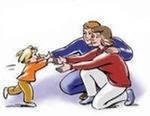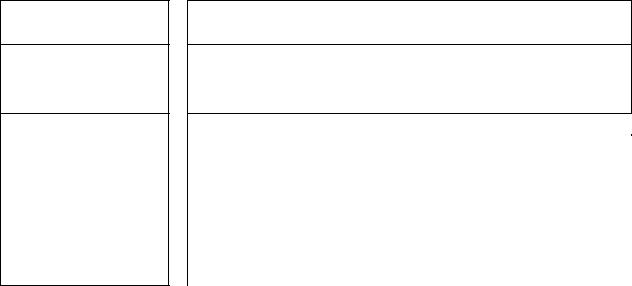
Методичка для СПО отредактир
..pdf1
МИНИСТЕРСТВО СЕЛЬСКОГО ХОЗЯЙСТВА РОССИЙСКОЙ ФЕДЕРАЦИИ ДЕПАРТАМЕНТ НАУЧНО-ТЕХНОЛОГИЧЕСКОЙ ПОЛИТИКИ И ОБРАЗОВАНИЯ
ФЕДЕРАЛЬНОЕ ГОСУДАРСТВЕННОЕ БЮДЖЕТНОЕ ОБРАЗОВАТЕЛЬНОЕ УЧРЕЖДЕНИЕ ВЫСШЕГО ПРОФССИОНАЛЬНОГО ОБРАЗОВАНИЯ
АЗОВО-ЧЕРНОМОРСКИЙ ИНЖЕНЕРНЫЙ ИНСТИТУТ ФГБОУ ВПО «ДОНСКОЙ ГОСУДАРСТВЕННЫЙ АГРАРНЫЙ УНИВЕРСИТЕТ»
Кафедра профессиональной педагогики и иностранных языков
К.Г. Иштоян
ENGLISH PRACTICE
учебно-методическое пособие по английскому языку для студентов специальностей
факультета среднего профессионального образования
Зерноград – 2015
2
УДК 811.18 (075.8)
Печатается по решению методического совета факультета среднего профессионального образования Азово-Черноморского инженерного института
ФГБОУ ВПО "Донской государственный аграрный университет" в г. Зернограде
Рецензенты:
доктор филологических наук, профессор Ласкова М.В.
кандидат филологических наук, старший преподаватель кафедры профессиональной педагогики и иностранных языков Новикова Ю.В.
Иштоян, К.Г. English Practice: учебно-методическое пособие по английскому языку для студентов специальностей факультета среднего профессионального образования/ К.Г. Иштоян. – Зерноград: АзовоЧерноморский инженерный институт ФГБОУ ВПО «Донской государственный аграрный университет», 2015. – 119с.
Настоящее учебно-методическое пособие составлено в соответствии с программными требованиям и основными компетенциями, необходимыми для освоения курса «Иностранный язык». Пособие предназначено для студентов специальностей факультета среднего профессионального образования АЧИИ ФГБОУ ВПО «Донской государственный аграрный университет» в г. Зернограде. Цель пособия – способствовать овладению грамматическими трудностями и лексическим минимумом по предлагаемым темам, а также обеспечить поддержание навыков чтения и устной речи на иностранном языке. Пособие состоит из тематических разделов, которые охватывают программу всего курса обучения. Каждый раздел содержит словарь, тематически подобранные тексты и диалоги, а также грамматические рекомендации и упражнения.
Рассмотрено и одобрено на заседании кафедры профессиональной педагогики и иностранных языков Протокол № 7 от 26 февраля 2015 г.
Рассмотрено и одобрено методическим советом факультета среднего профессионального образования
Протокол № 6 от 20 марта 2015 г.
©Иштоян К.Г., 2015
©Азово-Черноморский инженерный институт ФГБОУ ВПО ДГАУ, 2015
3
ВВЕДЕНИЕ
Предлагаемое учебно-методическое пособие предназначено для студентов специальностей факультета среднего профессионального образования АЧИИ ФГБОУ ВПО «ДГАУ» в г. Зернограде. Цель пособия – помочь студентам овладеть грамматическими и лексическими трудностями, а также поддержать навыки чтения и устной речи на иностранном языке по предлагаемым темам.
Пособие состоит из разделов, каждый из которых охватывает определенные грамматические явления и содержит лексический минимум, тексты и диалоги по определенной тематике. Предлагаемые упражнения носят аналитический характер, обеспечивая четкое понимание грамматических явлений, а также тренировочный характер, с целью закрепления выученных правил. Лексические и грамматические упражнения предназначены как для работы в аудитории, так и для самостоятельной работы студентов дома. Тексты на английском языке для перевода, отмеченные звездочкой (*), относятся к упражнениям повышенной сложности.
Врезультате освоения дисциплины обучающийся должен уметь:
общаться (устно и письменно) на иностранном языке на профессиональные и повседневные темы;
переводить (со словарем) иностранные тексты профессиональной направленности;
самостоятельно совершенствовать устную и письменную речь, пополнять словарный запас.
Врезультате освоения дисциплины обучающийся должен знать:
лексический (1200-1400 лексических единиц) и грамматический минимум, необходимый для чтения и перевода (со словарем) иностранных текстов профессиональной направленности.

4
MODULE 1 (Модуль 1)
Units (Разделы): 1. My Biography
2.My Friend
3.My House
Комплексная цель –
- освоение и закрепление навыков использования таких грамматических явлений, как to be, possessive adjectives/ pronouns, have/ has got, articles, numerals; singular/ plural nouns, possessive case, comparatives/ superlatives, Present Simple; there is/ are, prepositions of place, some/ any, countable/ uncountable nouns;
-овладение лексическим минимумом по темам «Моя биография», «Мой друг» и «Мой дом» (meeting people; countries and nationalities; appearance and character; relations with people; types of dwelling; rooms; conveniences));
-умение рассказать о себе и окружающих (с описанием внешности и характера), а также о своем жилище (с описанием интерьера).
UNIT 1.
MY BIOGRAPHY
Содержание
1.1. Verb “to be” (Глагол «to be»)
I |
|
am (not) |
|
|
|
|
|
am |
I |
|
|
|
|
|
|
|
|
|
|
|
|
|
|
|
|
He |
|
|
|
|
|
|
|
|
|
he |
from? |
|
She |
|
is (not) |
|
|
|
|
|
is |
she |
|
||
|
from Russia. |
|
Where |
|
|
|||||||
It |
|
|
|
|
|
it |
|
|
||||
|
|
|
|
|
|
|
|
|
|
|
||
We |
|
|
|
|
|
|
|
|
|
we |
|
|
You |
|
are (not) |
|
|
|
|
|
are |
you |
|
|
|
They |
|
|
|
|
|
|
|
|
|
they |
|
|
1.2. Possessive adjectives (Притяжательные местоимения) |
||||||||||||
|
|
|
|
|
|
|
|
|
|
|
|
|
|
|
|
my |
|
|
|
|
|
|
|
|
|
What`s |
|
your |
|
name? |
|
|
|
|
|
|
|
|
|
|
|
his |
|
|
|
|
|
|
|
|
|
|
|
|
her |
|
|
|
|
|
|
|
|
|
|
|
|
its |
|
|
|
|
|
|
|
|
|
That is |
|
our |
|
house. |
|
|
|
|
|
|
|
|
|
|
|
your |
|
|
|
|
|
|
|
|
|
|
|
|
their |
|
|
|
|
|
|
|
|
|
5
1. Read and act out a dialogue:
-Hello. What`s your name?
-Hello, my name`s Marie. What`s your name?
-I`m Pat. Where are you from, Marie?
-I`m from Paris. And you?
-I`m from Britain.
2. Complete the dialogue:
-Hello. I __ Renato. What ___ your name?
-Hello, Renato. My name ____ George.
-Where _____ you from, George?
-___ ___ from Athens. ____ are you from, Renato?
-___ ___ ___ Brazil.
3. Act out similar dialogues with the students in your class.
4. Put in am, is or are:
1.I … not tired.
2.These bags … heavy.
3.This bag … heavy.
5.I … a nurse. My brother … a taxi driver.
6.My brother and I … good tennis players.
7.Jane …. at home. Her children … at school.
4.The weather … nice today. 8. Look! There …… Ann.
5.Write true sentences, positive or negative. Use am/ am not, is/ isn`t, are/
aren`t:
For example: (I/ interested in sports) - He is interested in sports.
1.(I/ hungry) ………………………………………………….
2.(Rome/ in Spain) ……………………………………………
3.(We/ students) ……………………………………………….
4.(My hands/ dirty) …………………………………………….
5.(My friend/ afraid of dogs) …………………………………
6.(Canada/ a big country) ……………………………………..
7.(She/ married) ……………………………………………….
6. Put in the missing form of the verb “to be” and possessive forms:
For example: I am from England. My language is English.
1.He ______ from Japan. _______ language is Japanese.
2.We _______ from Turkey. ________ language is Turkish
3.You ______ from Spain. _______ language is Spanish.
4.I _____ from Greece. _______ language is Greek.
5.He ______ from Italy. ________ language is Italian.
6.She ______ from Germany. ________ language is German.
7.You _______ from France. ________ language is French.
8.They _______ from China. _________ language is Chinese.
6
7. Write about the people:
Surname |
Kamal |
First name |
Yasmin |
From |
Egypt |
Job |
Student |
Age |
19 |
For example: He is Yasmin Kamal. He is from Egypt. He is a student.
|
He`s nineteen. |
|
Surname |
Ramos |
|
First name |
Rafael |
|
From |
Mexico |
|
Job |
Doctor |
|
Age |
40 |
|
___________________________________________________________
Surname |
Novak |
First name |
Ilona and |
|
Laszlo |
From |
Hungary |
Job |
Teachers |
Age |
Ilona – 25 |
|
Laszlo – 28 |
___________________________________________________________
___________________________________________________________
8. Complete the sentences with a possessive adjective:
For example: I`m from Canada. My name is David.
1.London is famous for ____ parks.
2.This is my teacher. ____ name is Jane.
3.Mike is a journalist. ____ work is interesting.
4.Susan is in my class. ____ desk is near the window.
5.They are new students. ____ names are Mark and Brad.
9.Work in pairs. Make up a dialogue using the information from the boxes. Then tell the class about your partner in the 3rd person. Follow the example:
Name |
John Smith |
Country |
England |
Age |
36 |
Job |
teacher |
Phone number |
553 63 27 |
Married? |
Yes |
-What is your name?
-My name is John Smith.
7
-Where are you from?
-I am from England.
-How old are you?
-I am thirty-six.
-What is your job? (What do you do?)
-I`m a teacher.
-What is your telephone number?
-My phone number is double five three six three two seven.
-Are you married?
-Yes, I am.
This is John Smith. He is from England. He is 36. He is a teacher. His phone number is 553 63 27. He is married.
1. Name |
David Evans |
|
4. Name |
Jim Scott |
|||||
Country |
Scotland |
|
Country |
Canada |
|||||
Age |
|
23 |
|
|
|
Age |
29 |
||
Job |
|
businessman |
|
Job |
taxi driver |
||||
Phone number |
275 33 01 |
|
|
Phone number |
463 86 22 |
||||
Married? |
Yes |
|
Married? |
No |
|||||
2. Name |
Fernando Ramos |
|
5. Name |
Yoshi Suzuki |
|||||
Country |
Brazil |
|
Country |
Japan |
|||||
Age |
|
32 |
|
|
|
Age |
19 |
||
Job |
|
police officer |
|
Job |
student |
||||
Phone number |
852 03 66 |
|
|
Phone number |
580 33 90 |
||||
Married? |
Yes |
|
Married? |
No |
|||||
3. Name |
Mary Macdonald |
|
6. Name |
Françoise Monet |
|||||
Country |
the USA |
|
Country |
France |
|||||
Age |
|
38 |
|
|
|
Age |
42 |
||
Job |
|
shop assistant |
|
Job |
doctor |
||||
Phone number |
386 91 44 |
|
|
Phone number |
473 99 05 |
||||
Married? |
No |
|
Married? |
Yes |
|||||
1.3. have/ has got |
|
|
|
|
|
|
|
|
|
|
|
|
|
|
|
|
|
|
|
I |
|
|
|
|
I |
|
|
|
|
we |
have (not) got |
|
|
we |
|
|
|
||
you |
|
|
|
Have |
you |
|
|
|
|
they |
|
|
|
|
they |
got? |
|
|
|
he |
|
|
|
|
|
|
|
|
|
|
|
|
Has |
he |
|
|
|
||
she |
has (not) got |
|
|
|
|
||||
|
|
she |
|
|
|
||||
it |
|
|
|
|
|
|
|
||
|
|
|
|
it |
|
|
|
||
|
|
|
|
|
|
|
|
||
Examples:
I`ve got a motor-bike but I haven`t got a car.
Have you got a camera? – No, I haven`t.

8
Has Ann got a car? – Yes, she has.
What have you got in your bag? – Nothing. It`s empty.
1.4 Articles a/ an or the
It`s a |
magazine |
|
|
apple |
black umbrella |
|
It`s an |
English dictionary |
|
|
|
Tom has a son and a daughter. The son is 9 and the daughter is 14.
10.Put in have got, has got, haven`t got or hasn`t got:
1.Sarah …… dark hair and blue eyes.
2.Julia isn`t happy. She …… a lot of problems.
3.I`m very busy, I …… a lot of homework tonight.
4.Ann …… a car. She goes everywhere by bicycle.
5.Charles wants to go to the concert but he …… a ticket.
6.They like animals. They …… three dogs and two cats.
11.Write questions:
For example: (you/ a passport?) – Have you got a passport?
1.(your uncle/ a car) _______________________________________?
2.(you/ an umbrella?) ______________________________________?
3.(Julia/ many friends?) ____________________________________ ?
4.(how much money/ we?) __________________________________ ?
5.(what kind of car/ Carol?) _________________________________ ?
6.(you/ any brothers or sisters?)_______________________________?
7.(you/ a free evening next week?) _____________________________?
12. |
Write a or an: |
|
|
|
|
1. |
… hour |
5. |
…airport |
9. ... old book |
|
2. |
… horse |
6. |
…umbrella |
10. |
…new airport |
3. |
…window |
7. |
… organization |
11. |
…black umbrella |
13. Make sentences. Choose from Box A and Box B. Use a or an:
A. |
|
|
B. |
|
Barbara wants to learn |
Jim never wears |
|
Foreign language |
bicycle |
Tonight I`m going to |
Ann works in |
|
old house |
artist |
I want to ask you |
Tom lives in |
|
bookshop |
party |
My brother is |
I can`t ride |
|
question |
hat |
For example: Barbara wants to learn a foreign language.
1.__________________________________
2.__________________________________
3.__________________________________
9
4.__________________________________
5.__________________________________
6.__________________________________
7.__________________________________
14. Put in a/ an or the:
1.Jamaica is … island.
2.They can drive … car.
3.Don`t sit on … chair. It`s dirty!
4.Can you open … window, please?
5.I`d like to buy … hat and … umbrella.
6.Where is Amanda? – She is in … bathroom.
7.Tom is … student. He wants to be … journalist. He lives in … flat near his institute. … flat is small but he likes it.
15. Put in the articles, where necessary:
1.… Volga is … long river.
2.I see … box; … box is on … floor.
3.… England is in … north of …Europe.
4.… London is … large port on … Thames.
5.This is … picture; … picture in on … wall; … wall is white.
6.It is … tea; … tea is hot; …tea is in … cup; … cup is on … table.
7.These are … cars; … cars are in … street; … cars are black, white and red.
8.We see many tourists. They are from … Italy, … France, … Germany and
…USA.
1.5.Numerals:
a) Cardinal
|
1-12 |
13-19 (-teen) |
20-90 (-ty) |
|
|
100- … |
||
1 |
– one |
|
|
|
|
100 |
– a (one) hundred |
|
2 |
– two |
|
|
20 – twenty |
101 |
– a (one) hundred and one |
||
3 |
– three |
13 |
– thirteen |
30 – thirty |
125 |
– a (one) hundred and |
||
4 |
– four |
14– fourteen |
40 |
– forty |
twenty-five |
|||
5 |
– five |
15– fifteen |
50 |
– fifty |
200 |
– two hundred |
||
6 |
– six |
16 |
– sixteen |
60 |
– sixty |
1000 |
– a (one) thousand |
|
7 |
– seven |
17 |
–seventeen |
70 |
– seventy |
1005 |
– one thousand and five |
|
8 |
– eight |
18 |
– eighteen |
80 |
– eighty |
1235 |
– one thousand two hun- |
|
9 – nine |
19 – nineteen |
90 |
– ninety |
dred and thirty-five |
||||
10 – ten |
|
|
|
|
|
|
|
|
11 – eleven |
|
|
|
|
|
|
|
|
12 – twelve |
|
|
|
|
|
|
|
|

b) Ordinal
- th
1– the first
2 – the second
3 – the third
4 – the fourth
5 – the fifth
13 – the thirteenth
19 – the twentieth
21 – the twenty-first
30 – the thirtieth
100 – the hundredth
10
с) Dates
April 12, 1962 – April the twelfth/ the twelfth of April, nineteen sixty-two
1900 – nineteen hundred;
in 1907 – in nineteen o [ou] seven; 1965 – nineteen sixty-five.
d) Time
It is nine o’clock (9.00) |
It is half past nine (9.30) |
It is a quarter to ten |
It is a quarter past ten |
(9.45) |
(10.15) |
It is ten (minutes) to ten |
It is ten (minutes) past ten |
(9.50) |
(10.10) |
It is five (minutes) to one |
It is five (minutes) past |
(12.55) |
twelve (12.05) |
16. Write ordinal numerals: |
|
For example: One – the first |
|
two - _____________ |
one hundred - _____________ |
eighteen - _________ |
twenty-four - _____________ |
three - ___________ |
nine hundred and nine - _____________ |
fifty-five - _________ |
two thousand - ______________ |
twenty-three - ___________ |
seventy-one - _______________ |
six - __________ |
forty-five - _____________ |
17. Read English:
1.numbers: 6; 73; 38; 17; 13; 12; 0; 101; 152; 1,045; 6,671; 9,854; 87,432; 80,400; 329,645; 110,536; 13,614,200;
2.dates: June 1, 1905; May 9, 1945; July 2, 1800; March 30, 2000; October 25, 2005; January 18, 2013:
3.time: 3:10; 4:15; 5:45; 12:00; 1:30; 7:40; 2:05; 8:15; 4:00; 6:35; 7:50; 9:43;
10:23;
4.titles: Henry VII, Elizabeth II, James I, Charles V, Louis XII, Edward VII, Peter I, Catherine II;
5.telephone numbers: 213-66-01; 421-57-83; 221-00-74; 971-24-50; 426-11- 44; 157-18-20; 322-35-04;
6.phrases: exercise 5, page 312, bus 102, room 203, text 6, tram 17, lecture room 9, chapter 12, line 13, box 481.
